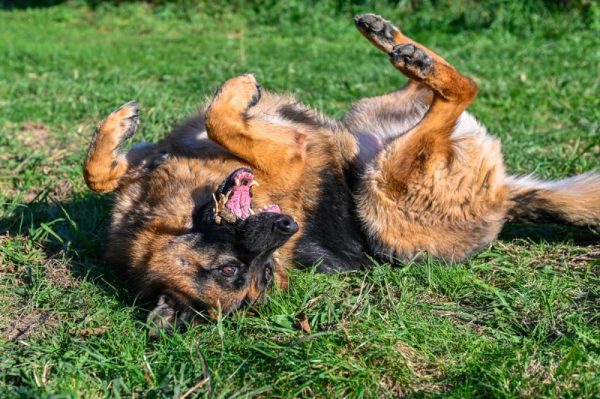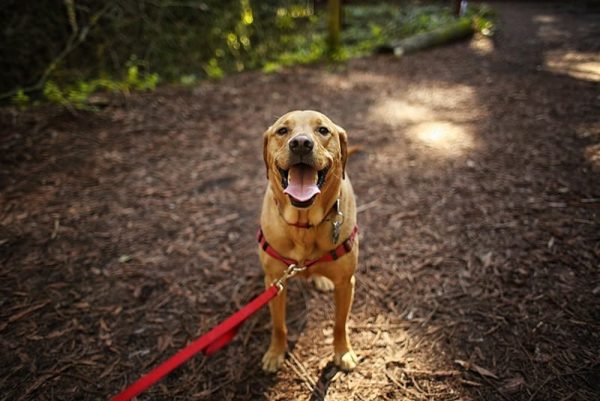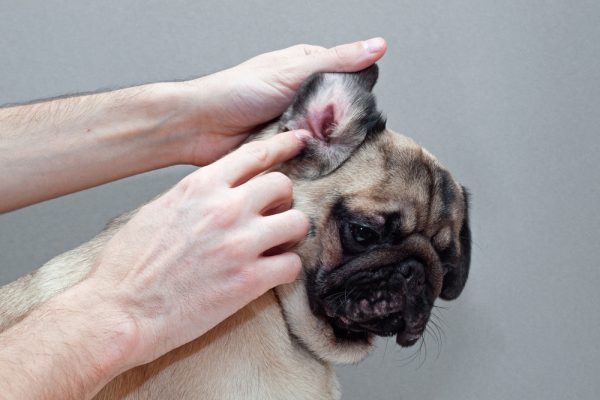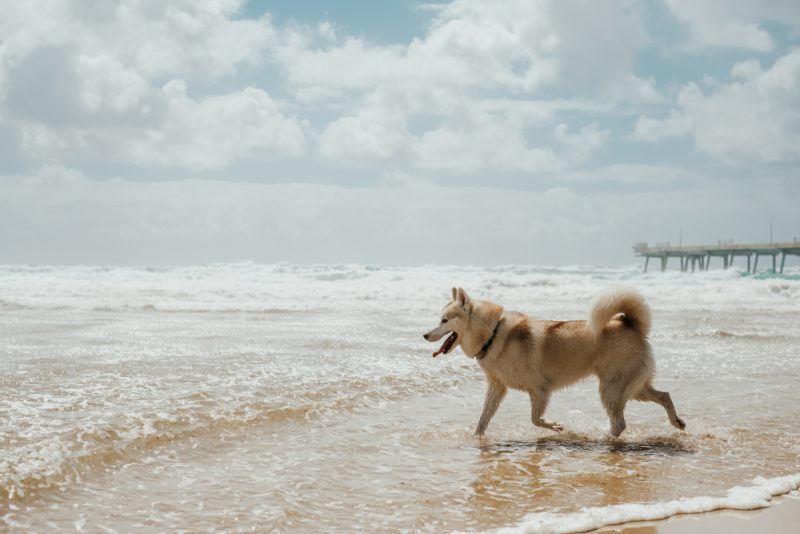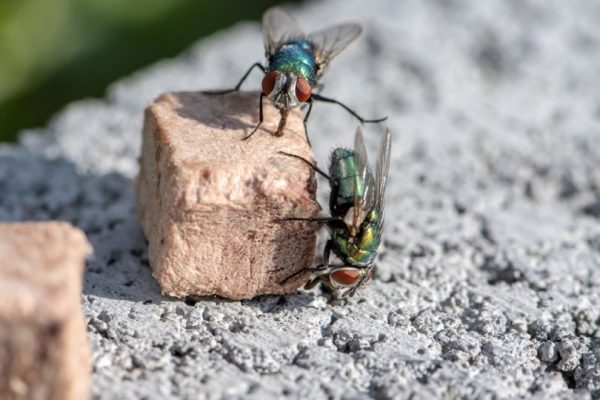In this article
View 8 More +Independent but loyal and energetic but lazy, the Toy Rat Doxie is a rather interesting mix. Don’t worry if you’ve never heard of this breed before. They’re a newer designer breed created by crossing the ever-popular Dachshund with a Rat Terrier. The size of this mix can vary widely, spanning weights of 6-35 pounds when fully grown. With no breed standards in place, you never really know what you’ll get with a Toy Rat Doxie, as they can still take on a variety of appearances.
Breed Overview
Height
8-18 inches
Weight
6-35 pounds
Lifespan
15-18 years
Colors
White, black, brown, cream, sable, red, brindle, pied
Suitable for
Families without young kids, seniors, individuals, apartment dwellers, those with previous dog experience
Temperament
Energetic, lazy, independent, spunky, loving, loyal, smart, friendly, stubborn
Because of their stubborn and independent nature, these dogs are generally best-off with owners that have previous dog experience. New dog owners might be put off by some of its mannerisms. Training a Toy Rat Doxie, for instance, is going to take a firmer hand and more patience than with many other breeds. Still, they’re affectionate and fiercely loyal canines, and they make great pets if you have the right expectations.
Toy Rat Doxie Characteristics

Toy Rat Doxie Puppies
The Toy Rat Doxie is a relatively new designer breed. Furthermore, this breed is quite rare, so even finding a puppy to purchase proves very difficult. To get a better feel for what you might spend on a Toy Rat Doxie, we’ll have to look at the parent breeds. One-half of the Toy Rat Doxie’s genes come from a Dachshund. Dachshunds are highly loved dogs, and the breed is currently the 12th most popular dog breed in the US. And the other parent breed, the Rat Terrier, might not be as popular but it is a more affordable dog breed.
Having a Toy Rat Doxie will be a once-in-a-lifetime experience. These small dogs have big personalities and quite a lot of energy, which is why they’re not recommended for first-time dog owners. They will need plenty of time commitment and training for them to grow into happy and healthy dogs.
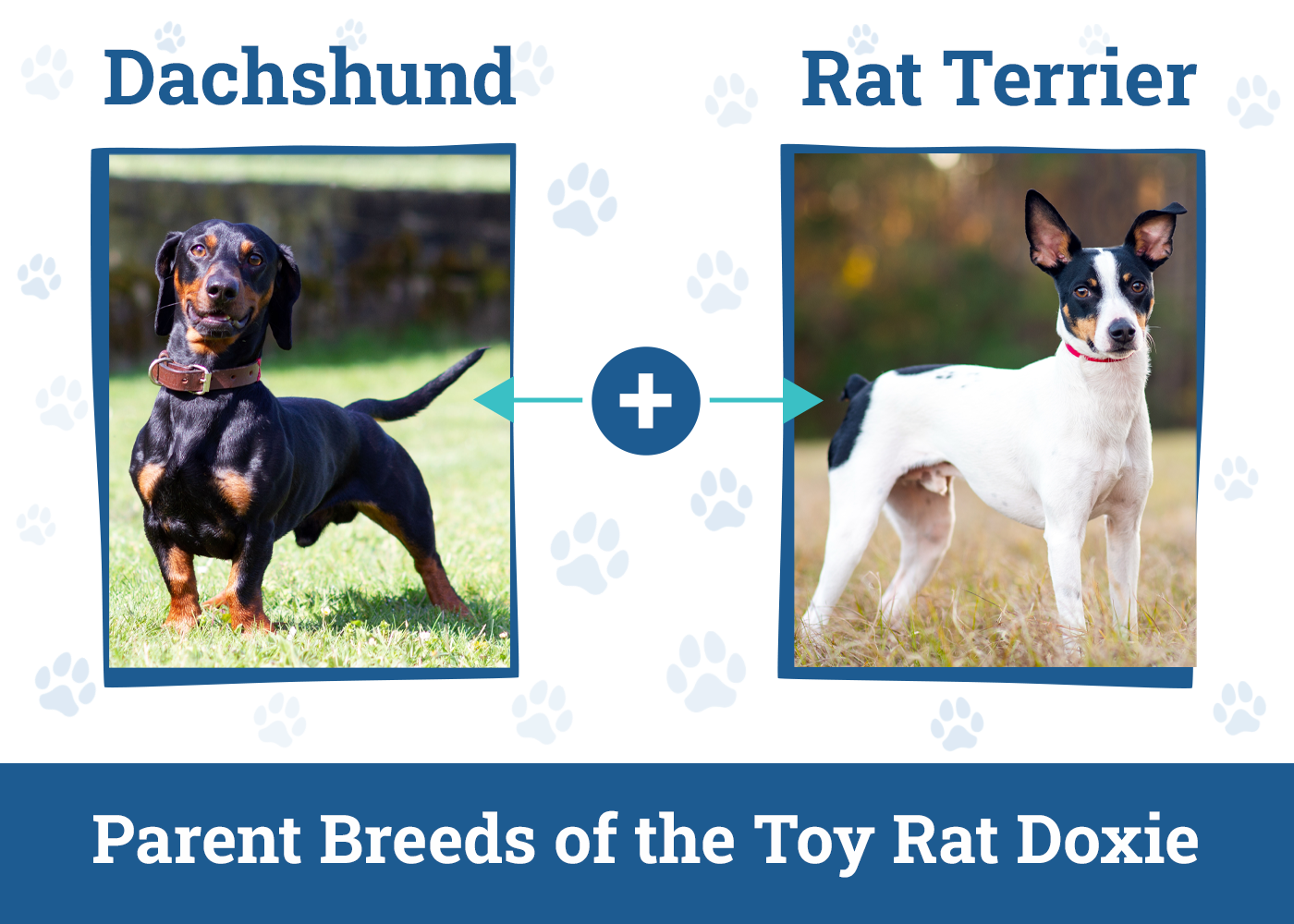
Temperament & Intelligence of the Toy Rat Doxie
Because its parents have completely opposite temperaments, your Toy Rat Doxie will likely get the best of both worlds. It will be a little independent, though still loving and affectionate. You might see a bit ofstubbornness taking after the Dachshund side of the family, but you’ll also see that incredibly loyalty they’re known for as well. Taking after the Rat Terrier, your puppy should be affectionate and obedient, even if the Dachshund in it makes it a bit harder to train than a Rat Terrier would be.
Toy Rat Doxies are highly intelligent dogs, but they require a lot of structure. You’ll need to socialize yours early on to try and hamper its overly strong prey drive that was inherited from two sets of hunting genes. Also, make sure to spend plenty of time playing with your dog to keep it engaged and provide an outlet for some of its excess energy. Because Toy Rat Doxies are so smart, they can easily become mischievous when their curiosity isn’t tempered by mental and physical stimulation.
Are These Dogs Good for Families?🏡
Because they’re affectionate and bond closely with their owners, Toy Rat Doxies can make excellent family dogs. However, some will choose just a single owner to bond closest with, so be sure there won’t be any jealousy if this happens. These dogs also do better with older children and aren’t always a great fit for households with young kids; particularly if the kids are loud and rough.
Does This Breed Get Along with Other Pets?🐶 😽
Toy Rat Doxies can get along with other dogs; especially if the other dogs are larger. Keep in mind, this breed has a very strong prey drive that it got from two sets of hunting parents. Even with early and regular socialization, you probably won’t completely erase your Toy Rat Doxie’s prey drive. They’re probably not a great fit for families with other small pets such as cats or smaller dogs. A Toy Rat Doxie might give chase or end up hurting one of your other pets.

Things to Know When Owning a Toy Rat Doxie:
Food & Diet Requirements🦴
Although they span a wide range of sizes, all Toy Rat Doxies fall squarely into the category of small dogs. At the largest, yours might be 35 pounds and 18 inches tall, though it’s likely going to be much smaller when fully grown, and could weigh as little as six pounds at full size! On average, a Toy Rat Doxie will eat about one cup of dry dog food each day. They don’t have any specific nutritional needs, though because of their susceptibly to both hip and elbow dysplasia, it might be a good idea to supplement your Toy Rat Doxie with supplements that aid in joint health, such as glucosamine, chondroitin, and Omega fatty acids.
Exercise🐕
This breed is spunky, fierce, and pretty energetic, when they’re not being completely lazy! But you’ll want to help get rid of some of that excess energy for the benefit of both you and your dog. When your dog has too much energy and it mixes with this breed’s curious nature, it can result in mischief and unwanted behaviors. To prevent this, you’ll want to provide about 45-60 minutes of playtime and exercise each day. This will ensure your dog is receiving adequate mental and physical stimulation.
Training🦮
Toy Rat Doxies can sometimes be easy to train, but other times they can be very stubborn and independent, which makes training far more difficult. It all boils down to which parent breed they take after more. If your dog is a bit more Dachshund, then it will probably be stubborn, independent, and take a lot more patience to train. On the other hand, if your dog takes more after the Rat Terrier side, then training will be easier since your dog will likely be more obedient and eager to please.
Because many of these dogs can be stubborn and harder to train, it’s often recommended that this breed is best reserved for experienced dog owners. A stubborn Toy Rat Doxie can be frustrating for a new owner who doesn’t understand why they’re having such a hard time training their dog!
Grooming ✂️
Overall maintenance of the Toy Rat Doxie isn’t too involved. Their coats don’t shed very much, so you can get away with brushing it just once each week. Their nails grow pretty fast though, so expect to trim them quite often. If your dog has floppy ears that hang over, you’ll probably need to spend more time cleaning the ears to prevent infection.
Dental problems are more common in this breed than others, so you should brush your dog’s teeth regularly. Additional visits to the vet for dental exams are also a good idea with Toy Rat Doxies.
Health & Conditions❤️
Designer breeds are often considered to be healthier than pure breeds in general, and susceptible to fewer major health concerns. Both of the Toy Rat Doxie’s parent breeds are vulnerable to a wide range of health problems, and even though chances of these illnesses are reduced in the Toy Rat Doxie compared to their parents, many are still possibilities.
In addition to these specific conditions, Toy Rat Dozies are also known to have spinal problems and dental health issues. They’re prone to early tooth loss, so proper dental hygiene is vital. And because of their elongated bodies, spinal issues are especially common in dogs that have to use stairs often. If you keep a Toy Rat Doxie, try not to make it use the stairs.
- Dysplasia
- Progressive Retinal Atrophy
- Bloat
- Patellar Luxation
- Intervertebral Disc Disease
- Legg-Calve Perthes Disease
- Cushing’s Disease
- Color Dilution Alopecia
Male vs Female
Because the Toy Rat Doxie is such a new breed, not a whole lot is known about temperamental differences between males and females. However, we can look to the parent breeds for some clues. Male and female Dachshunds, for example, have quite different personalities with males being more affectionate and playful while females are more independent and reserved. You might expect such traits to trickle down into the Toy Rat Doxie, offering similar differences between the sexes.
3 Little-Known Facts About the Toy Rat Doxie
1. They’re Adept Hunters
Hunting is in the Toy Rat Doxie’s blood. Both parents are top-notch hunting breeds that gained massive popularity for their incredible hunting prowess. Dachshund means “badger dog” in German, and originally, Dachshunds were bred to hunt badgers. Their long and low shape is to help them burrow into tunnels after the badgers they were hunting. Rat Terriers were created in an effort to control exploding rodent populations, and they saved many farms and crops from destruction.
Toy Rat Doxies don’t fall far from the tree. These dogs inherit excellent hunting instincts from their parents, even though most owners won’t put them to use. You’re still likely to see it manifest in their personality though, in the form of a very high prey drive.
2. Their Parents Have Opposite Temperaments
Though both of the Toy Rat Doxie’s parent breeds share a similar hunting background, their temperaments are polar opposites. Dachshunds are known for being very independent; a trait that comes in handy when they’re hunting down badgers. But that independence leads to stubbornness, which can make Dachshunds harder to train. Rat Terriers, on the other hand, are known for being highly affectionate, obedient, and eager to please; the exact opposite of a Dachshund.
Luckily, this means that your Toy Rat Doxie is likely to be a mix of these two personalities. It probably won’t be too stubborn or overly affectionate. Rather, your Toy Rat Doxie will be a bit of both. Still, it could take more after one side or the other, so don’t be surprised if yours is less cuddly and more independent than you hoped for!
3. They’re Prone to Separation Anxiety
Toy Rat Doxies, like both parent breeds, tend to form very strong bonds with at least one of their owners. While this is great as an owner, it can come with an inherent downside. Toy Rat Doxies are highly susceptible to separation anxiety. This can lead to all sorts of unwanted behaviors, so keep an eye out for the signs of separation anxiety so you can try to ease the anxiety for your dog when you’re gone.

Final Thoughts
Toy Rat Doxies are a genetic lottery still since the breed is so new. You might get more of a Dachshund or more of a Rat Terrier. Your dog could be as small as six pounds or as heavy as 35 when it’s fully grown. But with proper socialization and training, any Toy Rat Doxie can make a great pet.
Just be aware that yours might be more independent or it might be more obedient and eager to please. You might find your Toy Rat Doxie to be difficult to train, especially for a first-time dog owner. All of them have strong prey drives, so they’re not a great fit for houses with small pets. But because they form strong bonds with their family and offer a lot of love and loyalty, these dogs are ideal for seniors, couples, individuals, and families with older children, and they even do well in smaller living accommodations like apartments.
See also:
- Can Dogs Live Outside? Vet-Approved Safety Tips & Facts
- Can Dogs Eat Green Beans? Vet-Approved Feeding Facts
Featured Image Credit: Sara Hahn, Shutterstock






